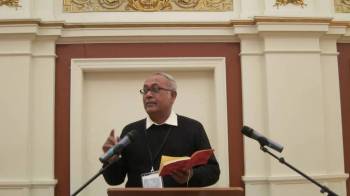Interview: Playwright Ashish Kumar Ghosh from India
Ashish Kumar Ghosh directs, teaches, performs, and helps organize the vibrant new chapter of ASSITEJ India. Oh, and he's also a playwright as well. WLPG was lucky to find him with a free moment to answer a few questions.
WLPG: Was there something in particular that motivated you to start writing for young audiences?
Ashish: I can recollect one particular motivation. It was in 1986. I was re-reading the famous fables from Panchatantra, a text from 300 BC. Somehow, I had an auto-suggestion that four fables could be connected to tell a story for today. The play was written in a week’s time. It was in verse with the idea of playing it in folk operatic style. Obviously, it had to be done with trained actors. That was it.
As I reflect now, perhaps two hidden motivations worked without my knowledge. One was that as a student of Political Science I had a natural inclination to choose themes with political import. The second was that I had just finished my association with an activity-based school where dramatics featured prominently. Now I wanted to take theatre to the schools and that was possible with adult actors. The new play was titled Raja Khojar Pala (In Search of a King) and poses the issue of democratic choice of ruler and its inherent contradictions. It was written in Bengali, and translated into Hindi by Safdar Hashmi, a theatre activist and writer of repute. It has been performed more times in Hindi and still remains a favourite with the actors and audience.
WLPG: Is there a production, playwright, or theatre company that has been influential on your work?
Ashish: I can recollect two. One is the plays written by Sukumar Ray (a genius in children’s literature and, incidentally, the father of film maestro Satyajit Ray). I was asked to do a play of his in his centenary year. His plays are generally done by children. While working on it, it struck me that justice to the script can be done only by adult actors. The play was a instant hit, inspiring me to do more plays with adult actors.
The second was the weekend puppet theatre of a young Dadi Pudumjee in the 1980s. It could show what professional actor-puppeteers could do to charm young and adult audience alike.
WLPG: Why is it important to write for children and young people?
Ashish: In India at least, there is notable absence of plays for children and young people. Plays for the adolescents are non-existent. Most of the plays are written to put children on stage, and bulk of them is moralising, patronising and de-contextualised fantasies. There is a need for mature plays with insight into young people’s lives and desires. Plays are needed for the trained theatre people to feel comfortable with scripts.
WLPG: What is your typical writing process?
Ashish: I am not a regular writer; in reality have written very few original plays which also includes plays for the adult audiences. But I have evolved a lot many plays in workshops with children and young adults, and these were subsequently written.
The typical process is the following:
a) Before I begin a workshop, I either work on a theme/issue, or put a poser for me. Examples of such posers are: ‘What is stage reality for children’, or ‘how children perceive space while doing theatre’, or ‘how the narrative traditions of India could be used to create theatre language’,
b) Decide on the parameters of enquiry through participatory mode,
c) Work on a storyline,
d) Build sequences,
e) Write the working draft for rehearsal purposes,
f) Feedback through rehearsals and initial shows, and
g) Re-writing the script.
WLPG: Is there any real difference between writing for young audiences and writing for adult audiences?
Ashish: Yes. Writing for the young audience has to be simple, and yet penetrating and profound. These deal with issues of growing up, and making sense with the world that is not of young people’s making. The adult plays, on the other hand, are emotionally complex because of engagements in passions, investments in possibilities, and ever present threat of non-accomplishment.
WLPG: Is there something about Indian writing for children and young people that is notable?
Ashish: There are good short stories and poems for young people belonging to the category of ‘fantastic’ and adventure. These are good entertainment, and can be adapted for stage.
WLPG: And, in the hopes of provoking some discussion: What question would you like to ask your fellow playwrights making plays for young audiences?
Ashish: Who decides what is best for the children and the young?
WLPG: We welcome your responses. Please click on 'Post a comment' below.
